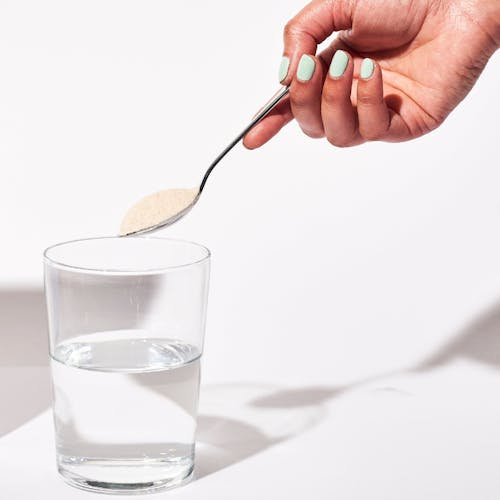This website uses cookies to enhance the user experience. By using Yoppie you are agreeing to our use of cookies.
Insulin-Resistant PCOS: More Common Than You Think
Written by Yoppie
22 May 2020
What is PCOS?
Endocrine-Metabolic Condition
What Is Insulin Resistance?
The Interplay Between Insulin Resistance and PCOS
Natural Treatment
The Bottom Line
The majority of people with PCOS have insulin resistance or high insulin levels, which can have long term health effects that go beyond fertility. PCOS is not curable, however, with the right lifestyle approach, insulin-resistant PCOS can be naturally treated to alleviate symptoms and prevent possible complications down the line.
What is PCOS?
PCOS is the most common endocrine condition in women at reproductive age and is the number one cause of infertility. Despite the widespread prevalence of PCOS, many women suffer with symptoms long before they are diagnosed (and indeed, some women never get diagnosed).
Symptoms vary between each person, but the most common ones are unexplained weight gain, excess hair growth, acne, depression, disrupted sleep, pelvic pain, disordered menstruation and fertility issues.
As you can imagine, such a collection of symptoms would make anyone feel emotionally and physically drained on a daily basis.
Endocrine-Metabolic Condition
PCOS is not fully understood, but treatment is mostly centred around fertility. Newly diagnosed women are often given two options, depending on whether or not they want to get pregnant — either birth control pill or a fertility drug called Clomid.
Despite the standard of care, PCOS is more than a fertility issue. PCOS is closely linked with insulin resistance and runs deep within metabolic health causing long term health consequences. This is called insulin-resistant type and accounts for 65-70% of all PCOS cases. Insulin resistance is generally associated with obesity, however 25% of this group are lean. So in other words, don’t rule out insulin resistance, even if you’re slim!
Looking at insulin-resistant PCOS through the lens of metabolism offers more options for treating PCOS symptoms, improving fertility and preventing complications down the line. Before we delve into treatment options, let’s first look at what insulin resistance is and how it affects health.
What Is Insulin Resistance?
Insulin resistance is when the body can’t use insulin efficiently. Insulin is an important hormone that regulates blood glucose within a normal range.
A rise in blood glucose (after eating, exercise or stress) stimulates the pancreas to secrete insulin. In normal circumstances, insulin stimulates the cells to uptake glucose to be used for energy — circulating blood glucose and insulin levels fall.
However, when cells are full of energy, they reject insulin signalling. The pancreas produces more insulin in an effort to move glucose out of the blood and into the cell.
Elevated insulin is an early sign of insulin resistance and a symptom of PCOS. In the later stages of insulin resistance, cells become increasingly resistant to insulin (even at higher levels). They no longer have the ability to accept glucose into the cell so blood glucose levels begin to rise. This is typically diagnosed as prediabetes or type 2 diabetes.
The Interplay Between Insulin Resistance and PCOS
Insulin resistance causes high insulin levels, which is a distinguishing feature between insulin-resistant PCOS and other types of PCOS. Blood tests like fasting insulin, glucose tolerance and HOMA index can help identify what kind of PCOS you have.
Insulin is the main driver of hormonal and metabolic disturbances in insulin-resistant PCOS. It causes weight gain, inflammation and excess production of testosterone in the ovaries, which activates PCOS symptoms.
Elevated insulin also increases the risk of developing metabolic complications like obesity and type 2 diabetes. Insulin-resistant PCOS has metabolic consequences that go further than fertility, unwanted hair, and acne, but before you go burying your head in the sand, this isn’t necessarily bad news.
Research has shown that with the right diet and lifestyle, insulin resistance can be managed. PCOS is a complex condition and many PCOS sufferers have limited treatment options. The majority of women live with debilitating symptoms of PCOS and only receive support when they want to have a child.
Understanding insulin resistant PCOS as a metabolic-endocrine condition opens more treatment opportunities that can heal PCOS symptoms and protect against disease later in life. PCOS is an early predictor for metabolic conditions like obesity and type 2 diabetes. With the right diet and lifestyle and taking action early, these conditions can be mitigated.
Natural Treatment
While the cause of insulin resistance remains to be fully understood, it appears to be tightly linked with inflammation, excess weight, and high levels of glucose and insulin.
Studies have shown that a low carbohydrate diet is an effective method for improving insulin sensitivity by reducing glucose and insulin load in the body, reducing inflammation and promoting fat loss. Therefore, women with insulin resistant PCOS may be able to apply a low carb diet to improve insulin resistance and alleviate PCOS symptoms.
There are a small number of studies that have researched the effect of a low carb diet on PCOS with promising results — improved hormone profile, lower insulin levels, improved insulin resistance, improved fertility and weight loss.
However, one study had a higher dropout rate for very low carb diets (<50g carb per day). In terms of sustainability, a moderate carb approach might be more suitable for some individuals.
Getting the balance right is key and the best person to understand this is you. Listen to your body and notice what level of carbohydrate intake improves your PCOS symptoms and feels sustainable.
The Bottom Line
PCOS significantly affects emotional and physical well being and treatment options are limited. The majority of women continue to bear the weight of symptoms and are only offered pharmaceutical treatments, which are not without side effects.
PCOS can manifest in different ways and there’s certainly no ‘one size fits all’. However, for those with insulin-resistant PCOS a low carb approach appears to be a low risk intervention that can dramatically improve short and long term quality of life.
If you’ve been diagnosed with PCOS, then the first step would be to work with your doctor and investigate whether or not you have insulin resistance. Then, when you feel ready, gradually reduce carbohydrate intake at a pace that feels right for you and listen in to how your body responds.
If you need extra support with dietary changes, check out the mobile app called Span. They offer personalised nutrition and behaviours learning that empowers people to manage debilitating conditions and symptoms. So far they have helped over 90% of members overcome PCOS, IBS, prediabetes, imbalanced hormones, weight issues, incessant hunger/cravings, irregular periods, brain fog and others. To find out more, download the app on iOS or Android, or book a free 10 minute phone consultation. They can also be found on www.span.health and instagram.
Managing PCOS symptoms and diet can be a royal pain, so don't forget that our personalised period subscription box can get organic cotton tampons, PCOS Supplements, and much more, delivered easily and regularly through your letterbox. That's one less thing to have on your plate.
This article was written in partnership with our friend Rachel Lett, who helped create Span, a mobile app that offers personalised nutrition and behaviour learning to empower people managing debilitating conditions and symptoms. Rachel is a certified chef and registered nutritionist. The content was also fact checked by Doctor Brooke Vandermolen.
Section jump
Back to top
Subscribe To Our Newsletter
YOPPIE





© 2026 Yoppie is a registered trademark of Phlo Technologies Ltd.
Yoppie's supplements are not a substitute for a varied diet and healthy lifestyle and are not intended to diagnose, treat, or cure any disease. If you are pregnant, breastfeeding, have a medical condition or are under medical supervision, please consult with your doctor before taking any of our products.








